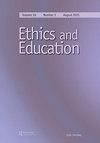Governance as subversion of democratisation in South African schools
IF 0.7
Q3 EDUCATION & EDUCATIONAL RESEARCH
引用次数: 0
Abstract
ABSTRACTIn post-apartheid South Africa, a foregrounding of democratic citizenship education through broadened and inclusive participation is especially evident in a decentralised school-based leadership, management, and governance system. Policy-wise, the involvement of parents in School Governing Body (SGB) structures is seen as an enactment of representative and collective consultation, key to the democratisation of schooling and education. In practice, however, the wide-sweeping authority of SGBs, has allowed several schools to continue a historical narrative of exclusion and inequality, effectively widening the gaps between historically advantaged and disadvantaged schools, and putting into effect renewed tensions of inequality and inequity. Key questions arise: has the state erred in its trust of SGBs to enact democratisation? Or are there limits to what democratisation can achieve? In considering these questions, the article explores re-considerations of governance so that interpretations of democratisation of schools are not used in the subversion of education as a public good.KEYWORDS: DemocratisationdecentralisationSouth AfricaGovernanceSchool Governing Body Disclosure statementNo potential conflict of interest was reported by the author(s).Notes1. Ethnically, the racial groups are sub-divided with the African community itself broken up as follows: the Nguni (comprising the Zulu, Xhosa, Ndebele, and Swazi people); Sotho-Tswana, who include the Southern, Northern and Western Sotho (Tswana people); Tsonga; Venda. White people are divided into Afrikaners and English (Soudien and McKinney Citation2016).2. Dr WWM Eiselen was a prominent Nationalist, former Secretary for Native Affairs and former Chief Inspector of Native Education (1936–1946). He compiled a document known as the Eiselen Commission Report (1951), urged the apartheid regime to take charge of education for ‘black’ South Africans in order to make it part of a general socioeconomic plan for the country.3. The Bantu Education Act (1953) stipulates that the term ‘bantu’ is synonymous with ‘native.’ But in reality that the apartheid regime did not want to use the term ‘native,’ because of it associations with colonization (Tomlin Citation2016).4. South Africa has eleven official languages are: Ndebele, Northern Sotho, Sotho, SiSwati, Tsonga, Tswana, Venda, Xhosa, Zulu, Afrikaans, and English.治理是对南非学校民主化的颠覆
在种族隔离后的南非,通过广泛和包容性的参与,民主公民教育的前景在分散的以学校为基础的领导、管理和治理体系中尤为明显。在政策方面,家长参与学校管理机构(SGB)结构被视为代表和集体协商的制定,是学校和教育民主化的关键。然而,在实践中,sgs的广泛权威,已经允许一些学校继续排斥和不平等的历史叙述,有效地扩大了历史上有利和不利的学校之间的差距,并使不平等和不公平的紧张局势重新生效。关键的问题出现了:政府是否错误地信任sgb来实施民主化?或者说,民主化所能取得的成就是有限的吗?在考虑这些问题时,本文探讨了对治理的重新考虑,以便对学校民主化的解释不会被用于颠覆作为公共利益的教育。关键词:民主化、分权、南非、治理、学校管理机构披露声明作者未报告潜在的利益冲突。在种族上,种族群体被细分,非洲社区本身被分解为:恩古尼人(包括祖鲁人、科萨人、恩德贝莱人和斯威士兰人);索托-茨瓦纳人,包括南部、北部和西部索托人(茨瓦纳人);特松加;文达语。白人被分为阿非利卡人和英国人(Soudien and McKinney Citation2016)。艾泽伦博士是一位杰出的民族主义者,曾任土着事务秘书和土着教育总督察(1936-1946)。他编写了一份被称为“艾泽伦委员会报告”(1951年)的文件,敦促种族隔离政权负责南非黑人的教育,以使其成为该国总体社会经济计划的一部分。《班图人教育法》(1953年)规定,“班图人”一词与“土著”同义。但实际上,种族隔离政权并不想使用“土著”这个词,因为它与殖民有关(Tomlin Citation2016)。南非有11种官方语言:恩德贝勒语、北索托语、索托语、西瓦蒂语、特松加语、茨瓦纳语、文达语、科萨语、祖鲁语、南非荷兰语和英语。
本文章由计算机程序翻译,如有差异,请以英文原文为准。
求助全文
约1分钟内获得全文
求助全文

 求助内容:
求助内容: 应助结果提醒方式:
应助结果提醒方式:


